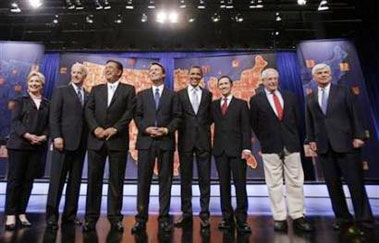US '08 campaign silence belies importance of China
(Reuters)Updated: 2007-07-17 14:53
 Democratic presidential candidates pose prior to the start of their debate at Howard University in Washington June 28, 2007. [Reuters]  |
The reasons for silence on the political trail range from the pressing fact that US soldiers are dying in Iraq and Afghanistan to a competitive China that threads through issues such as the environment, energy, economics and security, analysts say.
"If you think ahead to the challenges the US is going to face over the next 10 to 20 years, almost everyone would say that China is going to be one of those challenges," said Derek Chollet of the Center for a New American Security.
"Yet it's basically a non-issue so far on the campaign, so in terms of the level of importance versus the number of words spoken about it, there's a huge disparity," said Chollet, who advised Democrat John Edwards in the 2004 campaign.
In the issues sections of the Web sites of the three leading candidates from each major party, only Republicans John McCain and Mitt Romney touch on China.
McCain lists China and Russia as "potential strategic competitors" whose emergence requires a robust US military and must be hedged against with an effective missile defense.
Asked about China on a weekend campaign trip to New Hampshire, McCain said Beijing's growing economic clout was "a concern" but offered few concrete US responses.
"China is a reality. The question is not whether they are going to emerge on the world stage, the question is how," the Arizona senator said, and later apologized to the questioner. "I know I didn't answer your question very well."
Romney's campaign says "China and the rest of Asia are on the move economically and technologically." In recent speeches, the former governor of Massachusetts has said the answer to Asian challenges is not protectionism but competitive US education, tax and trade policies.
Silence May Be Golden
Democrats are focusing on ending the unpopular Iraq war and on domestic issues such as health care and job security that helped Bill Clinton defeat the internationalist Republican George H.W. Bush, the current president's father, in 1992.
China presented President George W. Bush with his first foreign policy crisis when it forced down a US spy plane after a collision with a Chinese fighter jet in April 2001.
"Historically, at least recently, Americans haven't picked their presidents based on foreign policy," said Nina Hachigian, senior vice-president of the Center for American Progress and a former member of Bill Clinton's national security team.
"Now, just Iraq has sucked up all the energy and all the air in the room that there is for foreign policy," she said, ranking China as extremely important but "not as urgent as Iraq, terrorism, Israel-Palestinian peace" and other issues.
Hillary Clinton's campaign Web site does not list China among key issues. But in speeches, the New York senator has said the United States must boost research and development to match China's growing innovation and condemned what she calls US tax incentives for companies that ship jobs overseas.
Clinton and her top Democratic rival, Sen. Barack Obama of Illinois, are co-sponsors of bipartisan legislation that would force tough action against countries seen as keeping their currency cheap for trade advantage -- chiefly China.
Obama, in an essay in Foreign Affairs this month, says of China, "our essential challenge is to build a relationship that broadens cooperation while strengthening our ability to compete."
Barring a dramatic incident involving the Chinese, analysts predict a sharper focus on China in just over a year, when US political parties hold nominating conventions and the 2008 Olympics focuses world attention on host Beijing.
The risk of staking out stark positions on China early is demonstrated in recent history. Nearly all recent presidents have issued "black and white campaign rhetoric on China and then had to walk that back as president," said Chollet.
Former US diplomat Chas Freeman, who interpreted for Richard Nixon when he opened ties with China 35 years ago, says dealing with Beijing will be a defining issue for the next president. But for now, the less said, the better, he added.
"I'm happy that the presidential campaign is relatively silent on China because campaigns do not bring out the greatest wisdom in our politicians," Freeman said.
|
|
|
||
|
||
|
|